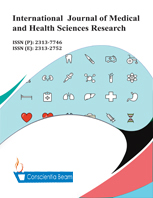The Correlation between Educational Level and Incidence of Syphilis among Female Sex Workers within 7 Cities in Indonesia in 2007
DOI:
https://doi.org/10.18488/journal.9/2015.2.8/9.8.141.149Abstract
Background: Syphilis is a chronic disease that may cause disability among patients and the child that is delivered by the patient. It is a sexually transmitted disease (STD), caused by Treponema pallidum. Syphilis may increase transmission of HIV/AIDS. The objective of this article is to reveal prevalence of syphilis and its risk factors among Female Sex Workers (FSWs) in 7 cities in Indonesia in 2007. Methods: The data analyzed in this article is derived from cross sectional study among FSWs in 7 cities in Indonesia in 2007. The respondents were chosen by cluster random sampling from Kupang, Samarinda, Pontianak, Yogyakarta, Timika, Makassar and Tangerang. Blood specimens were collected from respondents who fulfilled the inclusion criteria. The Diagnosis of Syphilis confirmed in accordance with the results of Rapid Plasma Reagen (RPR) and Treponema Pallidum Haemaglutination Assay (TPHA), and the educational data were collected by using structured questionnaire. Results: There were 1750 respondents who had the complete data, 12,2% respondent were diagnosed as Syphilis. The highest prevalence of Syphilis was in Makassar (64,5%). Indirect FSWs had infections 2,22 times higher compared to direct FSWs (RRa = 2,22 ; 95% CI = 1,67 – 2,96 ; p = 0,000). FSWs that never had formal study had 2.48 times higher incidence of syphilis compared to the high school graduates and university degree holders [Adjusted Relative Risk (RRa) = 2,84 ; 95% CI = 1,46 – 5,52 ; p = 0.002].Conclusion: Lack of knowledge because of low education among FSWs and no clinical symptoms in the early stage of syphilis makes its prevalence remained high. The Risk of syphilis among indirect FSWs was higher than the direct ones because of the difficulty to be reached by STD controlling programed.

